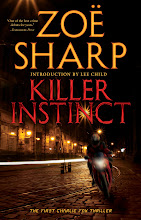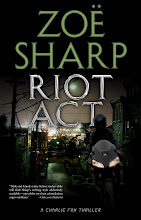
Busted Flush Press's reprint of Ace Atkins's first Nick Travers crime novel, Crossroad Blues (978-1-935415-03-9; paperback; $15) -- which will ship from Consortium to booksellers beginning December 11th -- features not only an original, never-before-published Nick Travers short story ("Last Fair Deal Gone Down"), it also offers the following new foreword by renowned music journalist Greil Marcus.
---------------------------------------
Copyright © Greil Marcus, 2009. Reprinted with permission.
---------------------------------------
Copyright © Greil Marcus, 2009. Reprinted with permission.
ROBERT JOHNSON GOT a few minutes in Phoenix, a 1997 cops-as-robbers bloodbath. In the Arizona bar she runs, Anjelica Huston leans over a jukebox, punching up Johnson’s “Terraplane Blues,” named for a ’30s machine and a concatenation of woman-as-automobile metaphors that makes Prince’s “Little Red Corvette” sound chaste. Cop Ray Liotta walks in, catches the tune: “My grandfather used to have one of those,” he says. “Good car.” “It’s not about a car,” Huston says mordantly. So they banter back and forth, tossing lines from the song at each other like Humphrey Bogart and Lauren Bacall running their horse-race double entendres in The Big Sleep. It’s as if familiarity with Robert Johnson music on the part of even vaguely cool middle-aged white people can be taken for granted, like alcohol and insomnia.
You can get as good a sense of Johnson’s presence in present-day life from this barely noticed movie as you can from any number of grander manifestations: his first-team 1986 entry into the Rock and Roll Hall of Fame; the 1990 release of his Complete Recordings, and the subsequent Grammy and gold-record awards; his 1994 stamp. There are novels, from Walter Mosley’s perfect-pitch RL’s Dream, his best, to Sherman Alexie’s pseudo-ghost story Reservation Blues, both from 1995. There are films, from Walter Hill’s puerile 1986 fiction Crossroads to Peter Meyer’s stunningly delicate 1997 documentary Can’t You Hear the Wind Howl?
All of this is based in the way one man hung sound in the air. That’s an event in Johnson’s “Come On In My Kitchen.” Each high guitar note stands out, flying away like a bird from the slow, nearly abstract rhythm, the apparent ground of the composition, then circling over the singer as if trying to decide whether to light. “You can see it,” the 1990s blues player Robert Cray says on the screen in Can’t You Hear the Wind Howl? “It’s so visual, the music is visual.”
More than seventy years after his murder in 1938, Johnson persists as the most famous and influential blues musician who ever lived. He is a man whose personal culture, his version of a local Mississippi culture—certain moves on six guitar strings, certain recastings of long-polished song fragments, certain inflections of common vocal patterns—has become world culture. Since his twenty-nine 1936 and 1937 recordings began to travel by way of reissue albums and rock ’n’ roll cover versions in the ’60s—the Rolling Stones’ “Love in Vain” and “Stop Breaking Down,” Cream’s “Crossroads” and “Four Until Late,” scores more—Johnson has pressed his case, and his case is an argument against life. Life insures that we will desire what we can’t have; life allows some of us to translate our frustration over our inability to live as we wish into art, and art is only a further trap. Its beauty finally does no more than mock the meaningless existence of those who make it, producing only a greater despair—and that, Johnson said in “Cross Road Blues,” “If I Had Possession Over Judgment Day,” and “Stones in My Passway,” is a cheat. But that’s not all: in Johnson’s hands this argument is an invitation to a dance, a joke, and a mystery.
This is the premise of Ace Atkins’s 1998 Crossroad Blues, a detective story featuring one Nick Travers, whom the reader meets as a professor of musicology at Tulane. Travers gets onto a story going around about a 1938 Robert Johnson recording session and nine sides no one has ever heard; no one can quite disbelieve it. Soon enough there’s an itinerant red-headed blueswoman, an albino black man who was present when Johnson was killed, a craven white promoter, more than one box of discs that all but glow with the sulfur of the forbidden, and a body walled up in a house for more than half a century.
Atkins has endless fun with material that has tortured so many writers before him. Crossroad Blues is a riot of Johnson lore, driven by the sort of stories generations of blues researchers would have sacrificed their children and parents to nail down: in these pages, Johnson is murdered by a white record producer for stealing his own records. Old crimes remain alive as shaggy-dog stories. “Shut his ass up, Willie,” a man who holds court in Three Forks, Mississippi, where Johnson was killed, says of the facts the blues professor has at his command. “Just made me fifty bucks yesterday from some Japanese. They thought I was Robert Johnson’s son.” But there is also something more, something none of the previous treatments of Johnson’s life, his legend, his myth, his recordings, even the two or three known photographs of the man himself have led anyone to put into words.
There comes a moment when Atkins seems to see through his own tale. He seems to realize that the story, like the little bird that might fly out of “Come On In My Kitchen,” will resist even those who can make a detective novel out of it. It’s a white man’s doubt in the face of a black man’s legacy, if not anyone’s doubt in the face of the rebuke art offers life. At the very least there is a deep feel for black secretiveness in the face of white greed, be it greed for the fortune the lost records represent or for the knowledge Atkins’s hipster academic momentarily suspects is not his to find. All books or movies about Robert Johnson ought to have a dream in them, but of the many that will follow Atkins’s, few will contain a dream as fine as this: “Black-and-white images of searching for Robert Johnson—his music grinding beneath a huge needle. Johnson gagging on his own blood as he vomited. Johnson smiling up at him and telling him, You’re not welcome. . . . You’re not part of this, he said. You’re not welcome.”
That dream, those words, didn’t stop Atkins, and they won’t stop anyone else. King of the Delta Blues was in preproduction at Rhino Films some years ago, with a script not only about but by Robert Johnson. One of those things: It’s a common name. There are seventeen in my telephone book, probably as many or more in yours, and one in none.
---------------------------------------
Greil Marcus is the author of The Shape of Things to Come, Mystery Train, Dead Elvis, and other books. He lives in Berkeley.
Look for Ace Atkins's Crossroad Blues, out in time for the holidays. The original Nick Travers story, "Last Fair Deal Gone Down," is set at Christmas! Visit Ace Atkins's blog here.
You can get as good a sense of Johnson’s presence in present-day life from this barely noticed movie as you can from any number of grander manifestations: his first-team 1986 entry into the Rock and Roll Hall of Fame; the 1990 release of his Complete Recordings, and the subsequent Grammy and gold-record awards; his 1994 stamp. There are novels, from Walter Mosley’s perfect-pitch RL’s Dream, his best, to Sherman Alexie’s pseudo-ghost story Reservation Blues, both from 1995. There are films, from Walter Hill’s puerile 1986 fiction Crossroads to Peter Meyer’s stunningly delicate 1997 documentary Can’t You Hear the Wind Howl?
All of this is based in the way one man hung sound in the air. That’s an event in Johnson’s “Come On In My Kitchen.” Each high guitar note stands out, flying away like a bird from the slow, nearly abstract rhythm, the apparent ground of the composition, then circling over the singer as if trying to decide whether to light. “You can see it,” the 1990s blues player Robert Cray says on the screen in Can’t You Hear the Wind Howl? “It’s so visual, the music is visual.”
More than seventy years after his murder in 1938, Johnson persists as the most famous and influential blues musician who ever lived. He is a man whose personal culture, his version of a local Mississippi culture—certain moves on six guitar strings, certain recastings of long-polished song fragments, certain inflections of common vocal patterns—has become world culture. Since his twenty-nine 1936 and 1937 recordings began to travel by way of reissue albums and rock ’n’ roll cover versions in the ’60s—the Rolling Stones’ “Love in Vain” and “Stop Breaking Down,” Cream’s “Crossroads” and “Four Until Late,” scores more—Johnson has pressed his case, and his case is an argument against life. Life insures that we will desire what we can’t have; life allows some of us to translate our frustration over our inability to live as we wish into art, and art is only a further trap. Its beauty finally does no more than mock the meaningless existence of those who make it, producing only a greater despair—and that, Johnson said in “Cross Road Blues,” “If I Had Possession Over Judgment Day,” and “Stones in My Passway,” is a cheat. But that’s not all: in Johnson’s hands this argument is an invitation to a dance, a joke, and a mystery.
This is the premise of Ace Atkins’s 1998 Crossroad Blues, a detective story featuring one Nick Travers, whom the reader meets as a professor of musicology at Tulane. Travers gets onto a story going around about a 1938 Robert Johnson recording session and nine sides no one has ever heard; no one can quite disbelieve it. Soon enough there’s an itinerant red-headed blueswoman, an albino black man who was present when Johnson was killed, a craven white promoter, more than one box of discs that all but glow with the sulfur of the forbidden, and a body walled up in a house for more than half a century.
Atkins has endless fun with material that has tortured so many writers before him. Crossroad Blues is a riot of Johnson lore, driven by the sort of stories generations of blues researchers would have sacrificed their children and parents to nail down: in these pages, Johnson is murdered by a white record producer for stealing his own records. Old crimes remain alive as shaggy-dog stories. “Shut his ass up, Willie,” a man who holds court in Three Forks, Mississippi, where Johnson was killed, says of the facts the blues professor has at his command. “Just made me fifty bucks yesterday from some Japanese. They thought I was Robert Johnson’s son.” But there is also something more, something none of the previous treatments of Johnson’s life, his legend, his myth, his recordings, even the two or three known photographs of the man himself have led anyone to put into words.
There comes a moment when Atkins seems to see through his own tale. He seems to realize that the story, like the little bird that might fly out of “Come On In My Kitchen,” will resist even those who can make a detective novel out of it. It’s a white man’s doubt in the face of a black man’s legacy, if not anyone’s doubt in the face of the rebuke art offers life. At the very least there is a deep feel for black secretiveness in the face of white greed, be it greed for the fortune the lost records represent or for the knowledge Atkins’s hipster academic momentarily suspects is not his to find. All books or movies about Robert Johnson ought to have a dream in them, but of the many that will follow Atkins’s, few will contain a dream as fine as this: “Black-and-white images of searching for Robert Johnson—his music grinding beneath a huge needle. Johnson gagging on his own blood as he vomited. Johnson smiling up at him and telling him, You’re not welcome. . . . You’re not part of this, he said. You’re not welcome.”
That dream, those words, didn’t stop Atkins, and they won’t stop anyone else. King of the Delta Blues was in preproduction at Rhino Films some years ago, with a script not only about but by Robert Johnson. One of those things: It’s a common name. There are seventeen in my telephone book, probably as many or more in yours, and one in none.
---------------------------------------
Greil Marcus is the author of The Shape of Things to Come, Mystery Train, Dead Elvis, and other books. He lives in Berkeley.
Look for Ace Atkins's Crossroad Blues, out in time for the holidays. The original Nick Travers story, "Last Fair Deal Gone Down," is set at Christmas! Visit Ace Atkins's blog here.































.jpg)


No comments:
Post a Comment